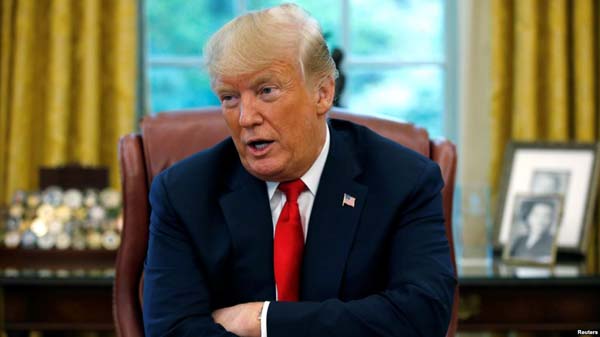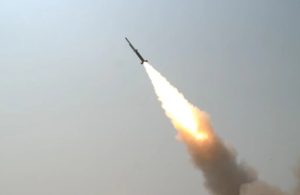NEW YORK – US President Donald Trump on Saturday gave Congress a defense of his decision to kill an Iranian general, even as he warned Iran the U.S. would strike them again if they retaliate for the drone attack that has drawn protests in the United States and threats of revenge from Iran.
“Let this serve as a WARNING that if Iran strikes any Americans, or American assets, we have targeted 52 Iranian sites” and they “WILL BE HIT VERY FAST AND VERY HARD,” Trump tweeted. “The USA wants no more threats!”
The president tweeted that the number of targets matched the number of hostages held by Iran in 1979, when 52 American diplomats and citizens were held for 444 days.
Iran is talking very boldly about targeting certain USA assets as revenge for our ridding the world of their terrorist leader who had just killed an American, & badly wounded many others, not to mention all of the people he had killed over his lifetime, including recently….
— Donald J. Trump (@realDonaldTrump) January 4, 2020
“Let this serve as a WARNING that if Iran strikes any Americans, or American assets, we have………targeted 52 Iranian sites (representing the 52 American hostages taken by Iran many years ago), some at a very high level & important to Iran & the Iranian culture, and those targets, and Iran itself, WILL BE HIT VERY FAST AND VERY HARD,” he said. “The USA wants no more threats!”
Trump’s tweet was vaguely worded, but the United Nations Security Council appears to suggest the targeting of cultural heritage sites is prohibited.
As Trump tweeted his own threat, his administration submitted a document required under the War Powers Act of 1973, which requires formal notification to Congress within 48 hours of military-style action.
Three government officials confirmed that the notice was delivered to Congress late Saturday, according to USA TODAY. A senior Democratic aide said it was unclear if the White House would release an unclassified version.
The White House has said the strike was legally justified because Iran Maj. Gen. Qasem Soleimani’s organization had been declared terrorists and carried out a number of attacks against U.S. troops in Iraq. Trump and other officials have also argued that Soleimani was planning future attacks on U.S. interests in the region.
House of Representatives Speaker Nancy Pelosi, a Democrat, said the administration provided little justification for the strike, and she called on Trump to provide more information about why the action was taken.
“This document prompts serious and urgent questions about the timing, manner and justification of the Administration’s decision to engage in hostilities against Iran,” Pelosi said.
Pelosi said Trump’s continuing confrontation of Iran “continues to put service members, diplomats and citizens of America and our allies in danger.”
Trump himself stayed largely out of the public eye Saturday as supporters and detractors argued over his decision to approve the attack on Soleimani – though he did issue his latest threat the U.S. would strike again if they retaliate.
“Iran is talking very boldly about targeting certain USA assets as revenge for our ridding the world of their terrorist leader who had just killed an American, & badly wounded many others, not to mention all of the people he had killed over his lifetime,” Trump said.
Meanwhile, in Iran and in parts of Iraq, mourners shouted that “revenge is coming” to the United States for the drone attack that killed Soleimani, the leader of Iran’s elite Quds Force.
“The great nation of Iran will take revenge for this heinous crime,” tweeted President Hassan Rouhani.
Citing the crowds of protesters, Iran Foreign Minister Javad Zarif said on Twitter that the “end of US malign presence in West Asia has begun.”
In the United States, critics questioned the Trump administration’s reasoning behind what some called an “assassination” of Soleimani, saying the president and his aides have provided no concrete evidence that he was planning an imminent attack on U.S. interests.
The attack exposes the United States to reprisals from Iran, and could also undermine its relationship with Iraq, critics said. Some suggested Trump was seeking to divert attention from his upcoming impeachment trial in the Senate.
Congressman Chris Murphy, a Democrat, said in a tweet that “Iran is full of malevolent evildoers, and Soleimani was the worst of them,” but it is also “a nation state.”
“And the reason the U.S. doesn’t kill leaders of other countries is because once you normalize assassinations, it’s hard to put the genie back in the bottle,” Murphy said.
Senator Bernie Sanders, an independent, said when Congress returns to session this month, its priority should be “to take immediate steps to restrain President Trump from plunging our nation into yet another endless war.”
Trump and aides said he began considering the operation after last week’s rocket attack by an Iran-backed militia that killed an American contractor in Iraq . The U.S. responded last weekend with strikes on militia camps that killed at least two dozen people.
Iranian supporters responded to that attack this past week by storming the U.S. Embassy compound in Baghdad, Iraq, burning facilities and threatening to breech the embassy itself.
Speaking with reporters Friday from his Mar-a-Lago estate in Palm Beach, Florida, Trump described the strike against the Iranian general as a defensive measure.
“Soleimani was plotting imminent and sinister attacks on American diplomats and military personnel,” Trump said. “But we caught him in the act and terminated him.”
Trump has spent the end-of-the-year holidays at Mar-a-Lago, and is expected to return to Washington, D.C., on Sunday.
Secretary of State Mike Pompeo continued to make calls to foreign leaders to discuss the attack that he described as a “defensive action.”














